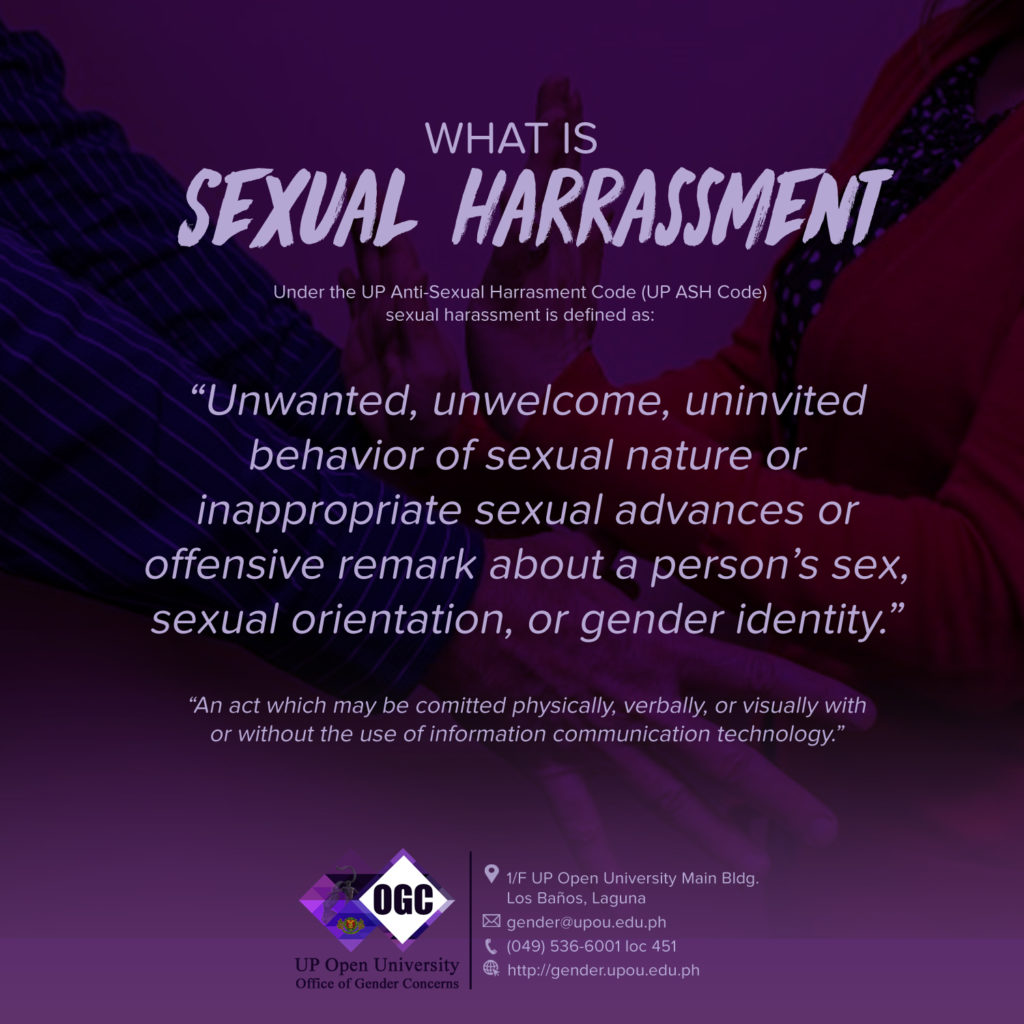The University of the Philippines System institutionalized a new Anti-Sexual Harassment Code, made public in March 2017, for compliance of all constituents of the university. Some highlights are as follows:
Under the UP Anti-Sexual Harassment Code (UP ASH Code) sexual harassment is defined as:
“Unwanted, unwelcome, uninvited behavior of sexual nature or inappropriate sexual advances or offensive remark about a person’s sex, sexual orientation, or gender identity.”
“An act which may be committed physically, verbally, or visually with or without the use of information communication technology.”
What can be considered sexual harassment?
Sexual harassment acts fall under three classifications:
- Light Offenses which include, but are not limited to:
- surreptitious looking or stealing a look at a person’s private parts or underclothing;
- sexual flirtation or persistent unwanted attention with sexual overtones;
- inquiries or comments about a person’s sex life and gender orientation; and
- communicating sexist/smutty remarks causing discomfort, embarrassment, offense, or
insult to the receiver;
- Less Grave Offenses which include, but are not limited to:
- verbal and/or non-verbal abuse with sexual overtones, including but not limited to, offensive hand or body gestures;
- touching or brushing against a victim’s body; and
- sexual advances or propositions
- Grave Offenses which include, but are not limited to:
- touching or groping of private parts of the body such as breast, genitalia, or buttocks;
- forced kissing;
- requesting for sexual favor in exchange for employment, promotion, local or foreign
travels, favorable working conditions or assignments, a passing grade, the granting of
honors or scholarship, or the grant of benefits or payment of a stipend or allowance;
Any member of the UP community is liable for sexual harassment. This includes (but not limited to) those who (a) directly participate in the execution of any act of sexual harassment, (b) benefits from the commission of any act of sexual harassment; (c) conceals or hides the commission of any act of sexual harassment; and (d) restrains, or coerces the victim from filing the appropriate complaint.
What are the penalties for offenders?
(a) For teaching or non-teaching personnel
Penalties are according to severity. This may be a reprimand or suspension for 1 month and 1 day to 6 months, or dismissal (even for light offenses).
(b) For students
Penalties are according to severity. This may be a reprimand or community service, or expulsion (even for light offenses).
(c) For other UP workers
They shall be proceeded against in accordance with the provisions of their contract with the University.
What are the procedures for sexual harassment cases?
There are two procedures provided under the UP ASH Code:
- Informal procedure which refers to University action other than the formal procedure. It may include alternative dispute resolution (ADR) mechanisms, corrective measures, and provision of support services, such as counseling, providing information, issuance of an administrative protection order, alternate or temporary shelter, study or work immersion, wellness programs and wholesome rehabilitative measures, and such other appropriate support.
- Formal procedure refers to an administrative disciplinary proceeding initiated upon a sworn written complaint and, after investigation, involves the issuance of a Formal Charge, the conduct of summary hearing, the resolution of a case, and the imposition of the corrective measure, if any.
What shall I do if I experience sexual harassment in the workplace?
File a report/complaint to the Office of Gender Concerns. Rest assured that your report/complaint will be dealt with accordingly.

